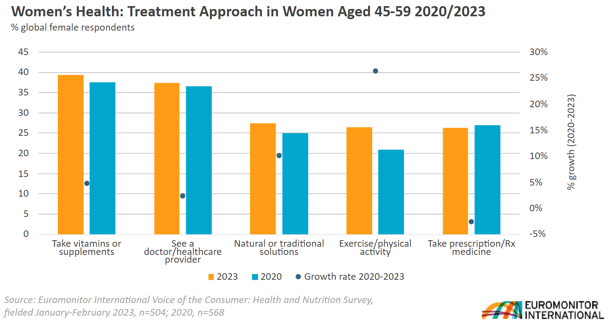- Focus on women's health driven by personalised care and self-care trends offers significant business opportunities
- Breaking taboos around topics such as menstrual care and menopausal health is boosting consumer demand
- Supplements have traditionally addressed women's health and there is rising recognition of the nutrition in functional food
- Opportunity to incorporate beneficial ingredients into everyday diets to complement a holistic approach to supporting women's health
LONDON, UK – Women are prioritising their health and embracing holistic, long-term solutions and trends to take charge of their wellbeing in the run up to International Women’s Day 2024, according to research conducted by Euromonitor International.

Maria Mascaraque, Head of Food and Nutrition at Euromonitor International, said the growing focus on women's health driven by personalised care and self-care trends offered significant business opportunities.
“Breaking taboos around topics such as menstrual care and menopausal health is boosting consumer demand. Also, while supplements have traditionally addressed women's health due to their targeted and concentrated nature, there is a rising recognition of functional foods' potential.
“This offers an opportunity to incorporate beneficial ingredients into everyday diets to complement a holistic approach to supporting women's health,” said Mascaraque.
Nutritional implications for women's health across the life stages
Mascaraque said that nutrition plays a crucial role in promoting wellbeing for women by addressing needs across different life stages with specific nutrients and botanicals, which can offer support in both preventive and treatment contexts.
“Women overall prioritise clean labels and avoid sugar showing very similar preferences across age groups, except for the 60+ group which exhibits distinct preferences, seeking to enrich their diet with additional nutrition as a priority.
“Women aged between 45-59, a demographic relevant for menopausal care, have a heightened interest in seeking out specific ingredients and nutrition labels. Within this age group, there is a higher preference to address health concerns with natural treatments, including supplements and traditional solutions.”
Mascaraque said this contrasts with a waning interest in prescription medicine within this group taking place since 2020. This indicates potential for functional nutrition such as soy-based foods and phytoestrogenic botanicals such as black cohosh and red clover can help alleviate symptoms.
“Other common nutrients and botanicals targeting women’s life stages include Siberian ginseng and ginger to support hormonal balance for menstrual care, and diets with folic acid, calcium, and omega-3s during pregnancy and postnatal care.
“Hormonal changes during pregnancy and menopause affect weight, an area of focus, while digestive health and metabolic syndrome are influenced by hormonal fluctuations and can benefit from prebiotics and probiotics.”
Mascaraque explained that in later life, women are also more predisposed to conditions such as cardiovascular diseases, joint pain and cognitive issues. A balanced diet with whole grains, lean proteins, and essential nutrients can help to manage them. Stress and anxiety, more prevalent in women due to hormonal factors, can find help in antioxidants and omega-3s.
“The crucial goal is to ensure transparency in communicating benefits that resonate with these consumer groups, rather than overly labelling towards a woman’s specific life stage.”
Current opportunities in maternal health and unexplored potential beyond it
Mascaraque said the availability of functional foods is not consistent across different life stages. Efforts have traditionally been directed towards maternal health, including pregnancy and postnatal care, primarily through dairy products such as powder milk. This is due to established awareness regarding the unique nutritional needs during this life stage, with other areas being largely unexplored or under-researched from a medical standpoint.
“There are opportunities to adopt a holistic approach in targeting women beyond reproductive age, by addressing specific nutritional needs related to bone health, digestion, hormonal fluctuations, skin/hair health and weight management, which are all common and often interconnected concerns.
“The forefront of functional foods targeting women is set by APAC. For example, Chinese dairy giant Yili offers powder milks tailored to adult women. These include a range with high iron and calcium, low-fat milk and fortified with probiotics, and another range, featuring red ginseng extract, emphasising beauty and energy benefits,” said Mascaraque.
For further information see Euromonitor’s report Women’s Health: Achieving Optimal Wellness Through Nutrition.
